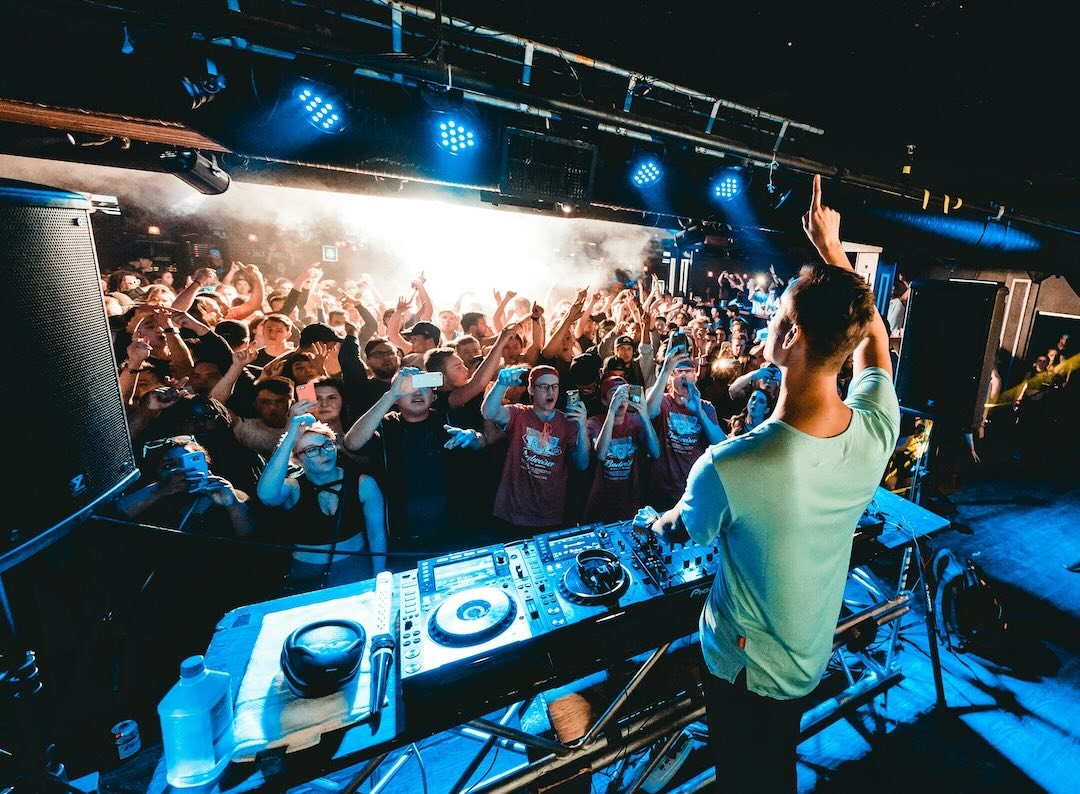What is the True Role of a DJ? Should We Be Standing Around Watching a DJ Like a Band?
September 10, 2024

In the ever-evolving world of music, the role of the DJ has been a subject of much debate. While some see them as the soul of the party, others question whether they should command the same attention as a live band. Not that a DJ is less important, but rather a part of the overall experience, connected emotionally with the crowd. The DJ feeding energy to the audience & the audience like a tornado whipping up and throwing energy back at the DJ. Some people believe that sticking a DJ on a stage to watch removes that soulful connection. Let’s dive into the origins, purpose, evolution, and different styles of DJing to unravel the true role of these modern-day maestros.
DJing, short for disc jockeying, began in the 1940s when radio DJs started spinning records to entertain listeners. The concept of a DJ as a live performer took off in the late 1960s and 1970s with the rise of dance clubs and parties. Innovators like DJ Kool Herc began experimenting with two turntables, extending instrumental breaks to create a new form of dance music that would eventually birth hip-hop. These early DJs were the unsung heroes of the nightlife, blending tracks to keep the dance floor alive and vibrant.
The main purpose of the DJ was to keep the energy flowing and the crowd moving. Unlike a band that performs pre-rehearsed songs, a DJ reads the room, adjusting the music in real-time to suit the mood and preferences of the audience. Their role was, and still is, to create a seamless, immersive experience that keeps people dancing. DJs were the unseen magicians behind the decks, crafting an auditory journey that connected with the crowd on a visceral level.
Over time, the DJ has evolved from a background facilitator of music to a central figure in the entertainment industry. The introduction of digital vinyl systems (DVS), CDJs, and controllers has revolutionized the art of DJing. Today’s DJs are not just playing records; they are remixing, sampling, and producing live. The modern DJ is a performer, a producer, and a curator, often commanding as much attention and respect as traditional musicians. Festivals like Tomorrowland and Ultra have elevated DJs to headliner status, where thousands gather not just to dance, but to watch the spectacle unfold. The unintended consequence of this, is that many DJs now perform a predetermined setlist that coordinates with the stage show, slowly drifting away from the original task step forth as code by the original founding fathers of the DJ.
Everything in life must evolve. So it doesn’t necessarily mean it’s a bad thing. It opens up diversity and creates more variety for people to choose from. An example is Hip Hop Scratch DJ vs. Festival House Music DJ. The role of a DJ can vary greatly depending on the genre and setting. A hip-hop scratch DJ, like DJ Qbert, is a virtuoso of the turntables, showcasing technical skill and creativity through scratching, beat juggling, and mixing. These performances are highly visual, making them compelling to watch. On the other hand, a festival house music DJ, like David Guetta or Calvin Harris, focuses on creating an expansive, euphoric atmosphere. Their sets are about building energy and taking the audience on a journey, often accompanied by stunning visual effects and pyrotechnics.
Given these differences, should we be standing around watching a DJ like a band? It depends on the context. In a club or festival setting, the DJ’s primary goal is to create an immersive experience, encouraging the crowd to dance and lose themselves in the music. Watching them is part of the experience, but it’s not the main event. However, for scratch DJs and those who incorporate live remixing and production into their sets, there is a strong visual element that can be just as captivating as watching a live band perform. Why limit someone’s creativity or set boundaries because of some unwritten rules of the past.
In conclusion, the true role of a DJ is multifaceted. They are mood-makers, energy conductors, and often, performers. Their impact on the music and the crowd is undeniable. DJs bridge the gap between pre-recorded music and live performance, creating an experience that is both immediate and transcendent. So, should you be standing around watching a DJ? If you appreciate their skill, creativity, and the atmosphere they create, why not? Whether you choose to dance or watch is up to you. After all, the DJ is the heartbeat of the party, and their role is to make sure that heartbeat never skips. So enjoy it however you see fit.